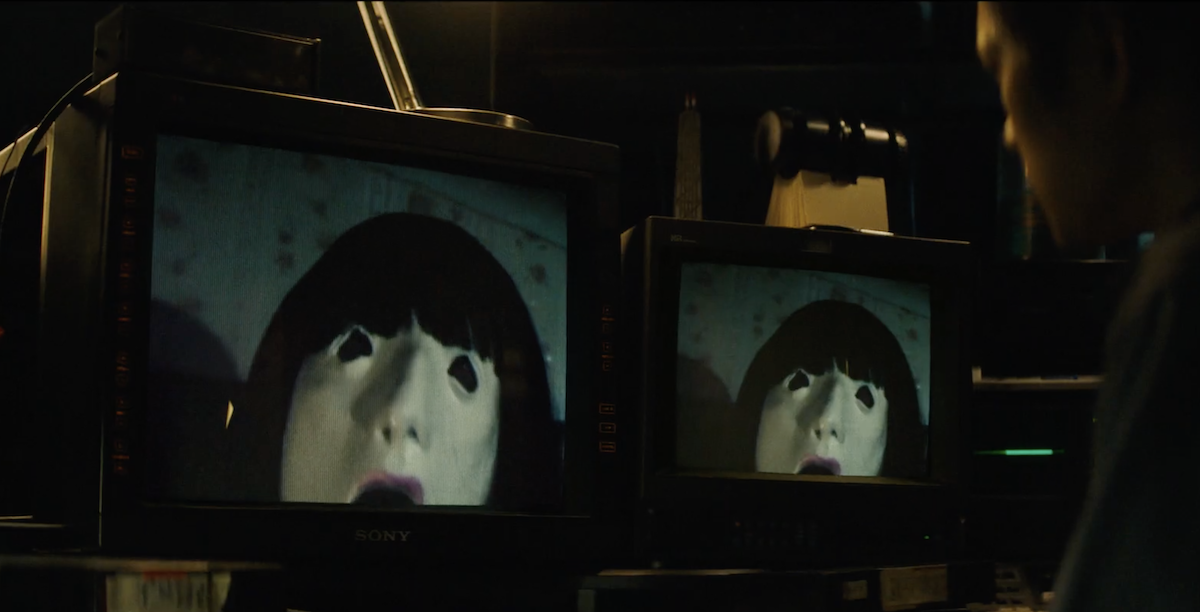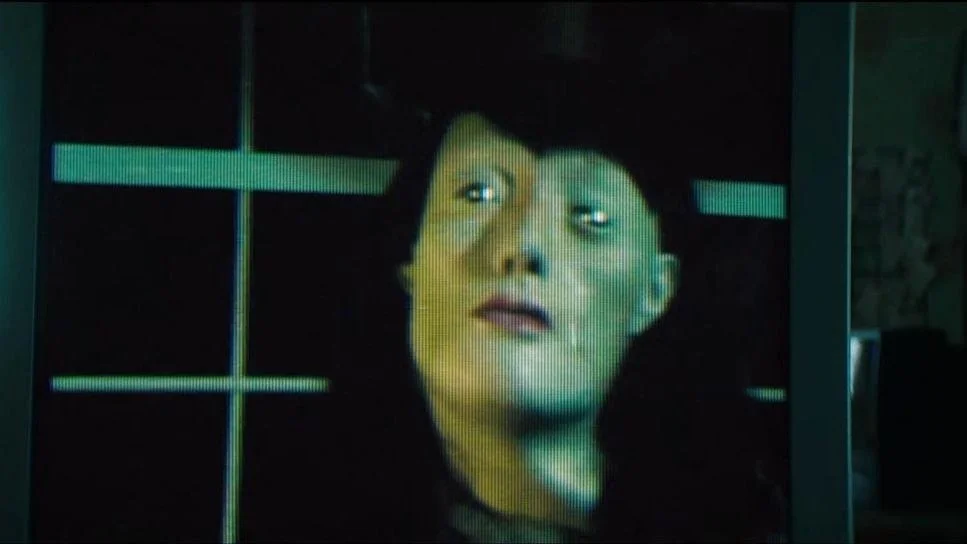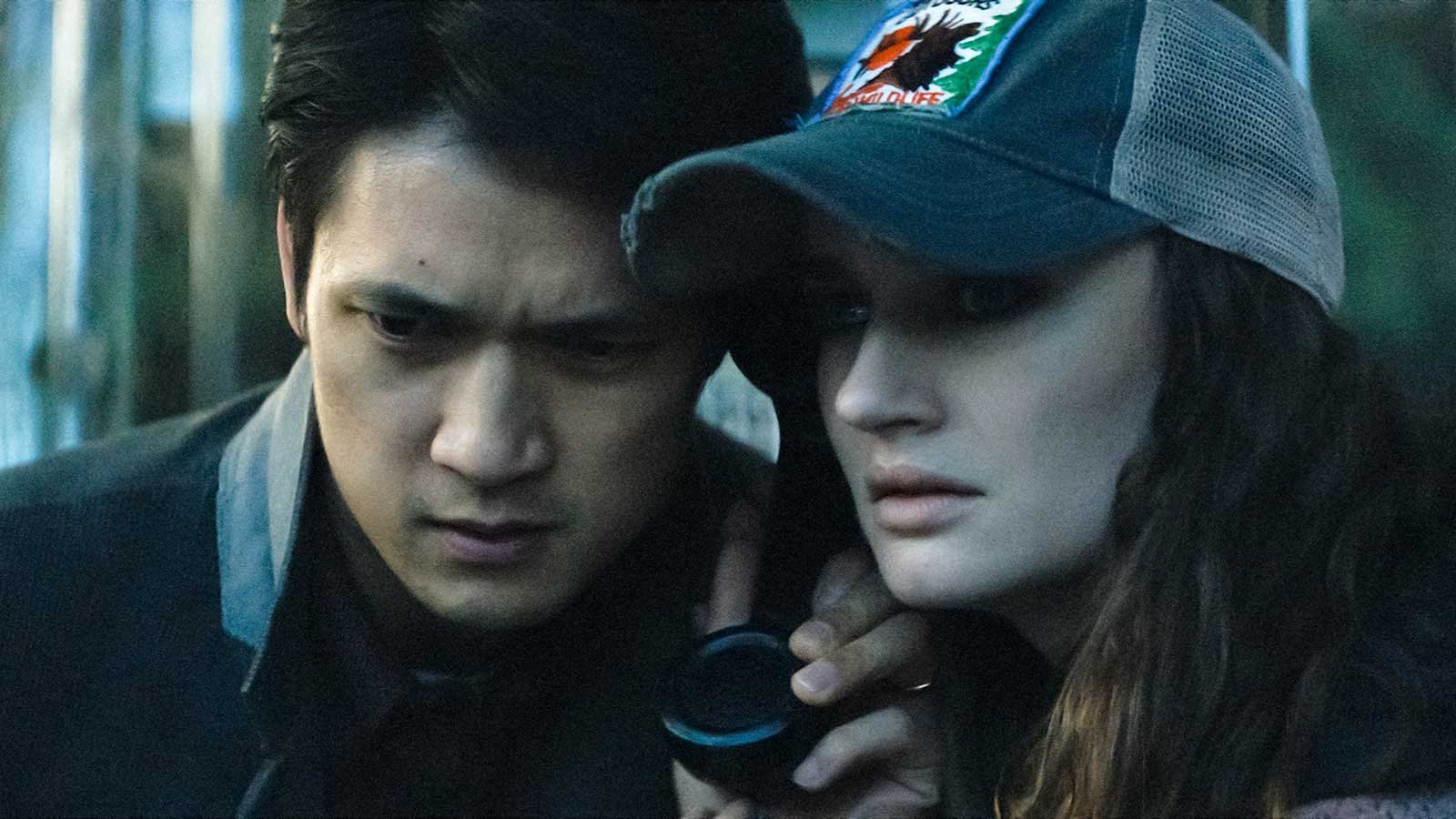[Editorial] Interview with the makers of Broadcast Signal Intrusion (2021)
At Celluloid Screams 2021, I grabbed a chat with Co-Screenwriter of Broadcast Signal Intrusion Phil Drinkwater and Producer Giles Edwards understanding the influences of the story and how the film evokes late 90s nostalgia. You can read my review of Broadcast Signal Intrusion here
Hannah (Interviewer): James, the main character, played by Harry Shum Jr, is dealing with his grief finds solace in investigating the conspiracy theory of the broadcast signal intrusions. Is that your experience of how people deal with dramatic life experiences? Finding answers somewhere else?
Phil Drinkwater (Co-Screenwriter): Yeah 100%. I think grief can make you spiral. And like any other kind of trauma, I think you need pattern or meaning in order to get passed it. You can do that legitimately or you do what I think James does, develop a coping mechanism to distract. Instead of facing and dealing in what that grief is and the finality of it, instead he decides to direct his focus to find pattern or meaning where there isn’t any. It is the fork in the road for someone who is dealing with grief which is ‘Am I going to stare this in the face and try to deal with it or am I going to distract myself with something that might provide a meaning that isn’t necessarily there.’
Giles Edwards (Producer): There is a concept in anxiety therapy, which a lot of people have gone through, called Tolerating Anxiety. And it’s a fundamental block of CBT where, instead of running away from something - its not even the fight or flight thing - you just live with it. And as you live with it, it impacts less and less and you find yourself tolerating it more. I think James’ character in the film does the wrong thing. Instead of sitting there and tolerating his anxiety or his grief he tries to cure it, tries to relate it to something else and as Phil says, that fork in the road is that point where you might say ‘Alright, I’ve done what I can – I am going to try something else. Maybe seek help.’ Or do you go the whole way like James does and that’s where it really hit home for me. I read a very believable and engaging protagonist who had an accessible well of grief, anxiety and depression which so many people, especially in the last couple of years, talk about now and we see how prevalent it is across every demographic. We are all fucked up. But we are talking about it more. And that’s the point of the film. At some point, James takes that step off into the abyss.
H: What you say there about how we as a society are a lot more open to mental illness. I have read a lot around how Millennials being more open mental health awareness is because of our shared experience of 9/11 – we watched a tragedy in real time. Phil – you spoke about 9/11 a lot in the Q&A earlier. How did that inspire you for this film?
P: The film is ambiguous you aren’t going to look at it and think ‘oh its about this’. The whole point of the film is so it has this universality to what the rabbit hole the protagonist falls down. But I think, like you said, there are two things that come out of that collective tragedy – you can go one way or another. Millennials perhaps have been so accustomed to a trauma like that and discussion of that trauma in a public forum has made them more resolute and open or willing to discuss those things. But there is the other side of that which is where an incident can lead people to want concrete explanations for it which perhaps aren’t there. I suppose, I don’t know if its just the same as it ever was. It could be the kind of person you are.
H: Conspiracy theories are ultimately trying to find someone to blame. Small tangent – I love conspiracy theories, and I listen to a comedy podcast on theories and went to a live show of theirs recently. I was really wondering what kind of people would be in the audience, a lot of people like myself who were there for the craic but there were a few who were deadly serious and they wanted answers. The host asked “who do you think is behind it all?” And your answers were The Illuminati or Bill Gates – but its people wanting someone to blame. Is James also looking for someone to blame for the loss of his wife, Hannah?
P: Yes – it’s a kind of sublimation, or a projection – like the figure of Michael (Justin Welborn) at the end of the film – I don’t think it is an accident that they are sort of doubles of each other by the time you get to the end, like how they are dressed or how they talk to each other. This is a confrontation of the self. And you can read that as a cathartic thing of James blaming himself or you can read it as James choosing someone and I will project this blame on to him.
G: And its scary not knowing the answer right? Not having closure. You can look at it as conspiracy theories, or religion. People believe in religion or god or conspiracy theories because they need to have a finite, concrete reason for something to be or to blame or to lean on. But other people who are perhaps more agnostic have found other ways of tolerating the anxiety, the lack of closure and go ‘Okay that is fine, they may explain themselves, they might not. And that is fine as I know where my place is and I am not investing anymore of my time leaning on whatever.’ I think it has to be a fundamental self-worth question and James in this film has absolutely no self-worth because he feels guilt over what he has or has not done, all of his doubts, especially in regards to Hannah – he doesn’t have the self-awareness to be able to manage it so it manifests itself into this very dark and horrible story.
H: The score really stood out to me. At the beginning there was a jazz vibe going on. Where did that come from?
G: Jacob the director comes from Atlanta and comes from a collective which is Dan Bush and David Bruckner who did The Signal (2007) about 10 years ago and has gone on to do The Ritual (2017) and The Night House (2020) and Ben Lovett (Composer) came from those guys. He is part of that group from Atlanta and he has done all of Jacob’s (Jacob Gentry, Director of Broadcast Signal Intrustion) films and all of David Bruckner’s films. He is a really kind of big deal now and because Jacob knew him, and due to mates rates, he signed on to what is a much smaller film than what he would usually do. He responded to the material and the tip score we had for him were films like Marathon Man (1976) – evocative of that time period – that’s where we had the shape of the film and Jacob styled it to be those classic film noirs from the 70s. Ben really leant into that. When we first heard that trumpet we knew it was fantastic. We also made a very conscious decision which was not to do what was the expected thing which would have been a synth score. There are some brilliant synth scores – but now the de facto response to a period film is a retro synth score. It can be great but it can also be a crutch and we wanted it to have the ability to span across decades – music of the 70s, set in the 90s and the resonance of current times makes it feel a bit more accessible and engaging. The score has been the stand out which every reviewer has picked up on because it is phenomenal.
H: The film being set in the 90s – how was that achieved through production?
G: Sarah Sharp who was our Production and Costume Designer. It was exciting as it is a period film but almost not period so its not wildly different. I think if it was set a further 4-5 years back, 94 and 95 – you would have really seen with the hair and the clothes the bootcut jeans – it would have felt a bit more of a Kevin Williamson homage. But because its on the cusp of the millennium, it was subtle degrees here and there and with anachronistic technology. In a way it helped because if it was set in 70s or 80s everything would have been set so differently to the cars, architecture – everything. The lates 90s setting was a smart bit of writing on Tim (Tim Woodall, Co-Screenwriter) and Phil’s part with the aesthetic went along with the overall philosophy of the film and brings a perfect partnership. I think when you rewatch the film, you notice these little elements which is really lovely but does not culminate in a demonstrative and overly emphatic piece of period filmmaking which is exciting for us but good from a financial perspective – as it costs money to make a period movie. It does give a flavour with the big jumpers, the shell suit jacket and the chain Alice (Kelley Mack) wears on her trousers. I don’t think we get to see this specific time period on film as it’s such a subtle period. Sometimes films want to convey a big sweeping statement of nostalgia-porn, we wanted to do something more elegant.
We go on to talk about the end of the film, this is your spoiler warning!
H: Towards the end of the film, the mystery of Hannah feels second to James’ desire to find out who is behind the broadcasts – what was the driver for that decision?
P: It goes back to what we were saying earlier. It is no longer a constructive or a semi-constructive dealing of grief.
G: There is no catharsis there. James wants to now prove himself as the hero – but who for? It’s a meaningless gesture now. It was about trying to – not save Hannah as he never could which is the root of his grief – but find some way to honour her and find out what actually happened in order to get closure. But now it becomes more about ‘defying the man’.
P: There is a history in films of presenting a male protagonist with an obsession and a destructive nature and the film chooses to place the audience in the perspective of those characters at the beginning of the story so you slowly become distant from them as they become more and more destructive. The audience is encourages to become critical. It is used often in cinema, the demonstration of the impulse to destroy what you are looking to uncover, like in Vertigo (1958) or Three Days of the Condor (1975) - by the time you get to the end, these characters have become hollow shells or have become the destructive thing they were looking to illuminate or seek out.
G: In the end James is not the hero. He is someone to be pitied but he has gone beyond the pale. He has become a killer. Like Gene Hackman in The Conversation (1974), his life’s work has imploded and he could have just tolerated his unease as that’s what many of us do. But James decides to push beyond that and destroy everything that he was as a person which is a lot worse than where he was at the beginning.
H: One last question, what is your favourite conspiracy theory? Not one you necessarily believe in, but one that intrigues you.
P: I am a terrible reader of fiction, so all I read are books about movies or books about the death of Marilyn Monroe. There is a book called Goddess that came out in the 80s around the conspiracy theories surrounding Marilyn Monroe’s death by Anthony Summers. He worked for World at Action and was an investigative journalist. But the book comes to no conclusions – which is amazing for one of those books. It blew my mind when I first read it and its probably the book I have read the most. I don’t think there was necessarily any foul play or her being murdered and that’s what the book is so great at doing by looking at all these loose threads and refusing to tie them together. And linking into the film, all the theories that came out of 9/11, from an almost anthropologist point of view, you are stood out here and watching all the different threads people were following and thinking what and why and how did we get here. I find both so fascinating. Why do people need them? Because we all do, it’s a coping mechanism.
G: In one respect, I am a Fox Mulder and I love them all – like aliens in outer space – love them all. But in real terms, I don’t think any of them are worth a lick. But I love what it represents around human nature. My favourite conspiracy theory of all time is the Pizzagate because it is so ridiculously insane that I literally cant understand how people actually believe it exists but I love that there are people who genuinely believe that two high ranking US officials eat the blood of virgin babies in a pizza restaurant in Brooklyn – it feels so Alan Partridge or from Vic and Bob. I love that they are out there but also terrified. The world is a creative place.





![[Editorial] Metal Heart: Body Dysmorphia As A Battle Ground In Tetsuo: The Iron Man (1989)](https://images.squarespace-cdn.com/content/v1/5fe76a518d20536a3fbd7246/1690190127461-X6NOJRAALKNRZY689B1K/Screenshot+2023-07-24+at+10.08.27.png)
![[Editorial] 8 Body Horror Short films](https://images.squarespace-cdn.com/content/v1/5fe76a518d20536a3fbd7246/1690838270920-HWA5RSA57QYXJ5Y8RT2X/Screenshot+2023-07-31+at+22.16.28.png)
![[Editorial] Top 15 Female-Focused Body Horror Films](https://images.squarespace-cdn.com/content/v1/5fe76a518d20536a3fbd7246/1689081174887-XXNGKBISKLR0QR2HDPA7/download.jpeg)
![[Editorial] Top 15 Female-Focused Mind Horror Films](https://images.squarespace-cdn.com/content/v1/5fe76a518d20536a3fbd7246/1691247166903-S47IBEG7M69QXXGDCJBO/Image+5.jpg)
![[Editorial] 5 Slasher Short Horror Films](https://images.squarespace-cdn.com/content/v1/5fe76a518d20536a3fbd7246/1696358009946-N8MEV989O1PAHUYYMAWK/Screenshot+2023-10-03+at+19.33.19.png)
![[Editorial] Eat Shit and Die: Watching The Human Centipede (2009) in Post-Roe America ](https://images.squarespace-cdn.com/content/v1/5fe76a518d20536a3fbd7246/1691245606758-4W9NZWE9VZPRV697KH5U/human_centipede_first_sequence.original.jpg)
![[Editorial] If Looks Could Kill: Tom Savini’s Practical Effects in Maniac (1980)](https://images.squarespace-cdn.com/content/v1/5fe76a518d20536a3fbd7246/1694952175495-WTKWRE3TYDARDJCJBO9V/Screenshot+2023-09-17+at+12.57.55.png)
![[Editorial] “I control my life, not you!”: Living with Generalised Anxiety Disorder and the catharsis of the Final Destination franchise](https://images.squarespace-cdn.com/content/v1/5fe76a518d20536a3fbd7246/1696444478023-O3UXJCSZ4STJOH61TKNG/Screenshot+2023-10-04+at+19.30.37.png)
![[Ghouls Podcast] Maniac (2012) with Zoë Rose Smith and Iona Smith](https://images.squarespace-cdn.com/content/v1/5fe76a518d20536a3fbd7246/1696356006789-NYTG9N3IXCW9ZTIJPLX2/maniac.jpg)
![[Editorial] 8 Mind Horror Short films](https://images.squarespace-cdn.com/content/v1/5fe76a518d20536a3fbd7246/1693504844681-VPU4QKVYC159AA81EPOW/Screenshot+2023-08-31+at+19.00.36.png)
![[Editorial] Editor’s Note: Making a slash back into September](https://images.squarespace-cdn.com/content/v1/5fe76a518d20536a3fbd7246/1694354202849-UZE538XIF4KW0KHCNTWS/MV5BMTk0NTk2Mzg1Ml5BMl5BanBnXkFtZTcwMDU2NTA4Nw%40%40._V1_.jpg)

![[Editorial] Unravelling Mitzi Peirone’s Braid (2018)](https://images.squarespace-cdn.com/content/v1/5fe76a518d20536a3fbd7246/1628359114427-5V6LFNRNV6SD81PUDQJZ/4.jpg)
![[Editorial] In Her Eyes: Sara Lowes in Witchfinder General (1968)](https://images.squarespace-cdn.com/content/v1/5fe76a518d20536a3fbd7246/1655655953171-8K41IZ1LXSR2YMKD7DW6/hilary-heath.jpeg)
![[Editorial] Sally Hardesty in The Texas Chainsaw Massacre (1974)](https://images.squarespace-cdn.com/content/v1/5fe76a518d20536a3fbd7246/1637247162929-519YCRBQL6LWXXAS8293/the-texas-chainsaw-final-girl-1626988801.jpeg)
![[Editorial] Re-assessing The Exorcist: Religion, Abuse, and The Rise of the Feminist Mother.](https://images.squarespace-cdn.com/content/v1/5fe76a518d20536a3fbd7246/1629995626135-T5K61DZVA1WN50K8ULID/image2.jpg)
![[Editorial] Sara in Creep 2 (2017)](https://images.squarespace-cdn.com/content/v1/5fe76a518d20536a3fbd7246/1646478850646-1LMY555QYGCM1GEXPZYM/27ebc013-d50a-4b5c-ad9c-8f8a9d07dc93.jpg)
![[Editorial] Lorraine Warren’s Clairvoyant Gift](https://images.squarespace-cdn.com/content/v1/5fe76a518d20536a3fbd7246/1648576580495-0O40265VK7RN03R515UO/Image+1+%281%29.jpg)
![[Editorial] In Her Eyes: Tasya Vos in Possessor (2020)](https://images.squarespace-cdn.com/content/v1/5fe76a518d20536a3fbd7246/1667061747115-NTIJ7V5H2ULIEIF32GD0/Image+1+%285%29.jpg)
![[Editorial] In Her Eyes: Helen Lyle in Candyman (1992)](https://images.squarespace-cdn.com/content/v1/5fe76a518d20536a3fbd7246/1649586854587-DSTKM28SSHB821NEY7AT/image1.jpg)
![[Editorial] The Babadook (2014)](https://images.squarespace-cdn.com/content/v1/5fe76a518d20536a3fbd7246/1651937631847-KR77SQHST1EJO2729G7A/Image+1.jpg)
![[Editorial] American Psycho (2000)](https://images.squarespace-cdn.com/content/v1/5fe76a518d20536a3fbd7246/1627317891364-H9UTOP2DCGREDKOO7BYY/american-psycho-bale-1170x585.jpg)
![[Editorial] Margaret Robinson: Hammer’s Puppeteer](https://images.squarespace-cdn.com/content/v1/5fe76a518d20536a3fbd7246/1630075489815-33JJN9LSGGKSQ68IGJ9H/MV5BMjAxMDcwNDI2Nl5BMl5BanBnXkFtZTcwOTMxODgzMQ%40%40._V1_.jpg)






















![[Editorial] 10 Films & Events to Catch at Soho Horror Film Fest 2023](https://images.squarespace-cdn.com/content/v1/5fe76a518d20536a3fbd7246/1700819417135-299R7L4P0B676AD3RO1X/Screenshot+2023-11-24+at+09.41.52.png)
![[Editorial] 9 Horror Nintendo Switch Games To Play](https://images.squarespace-cdn.com/content/v1/5fe76a518d20536a3fbd7246/1697214470057-3XZXX8N4LYIMDFWS6Z3P/Screenshot+2023-10-13+at+17.20.13.png)
![[Mother of Fears] Mothering in Silence in A Quiet Place (2018)](https://images.squarespace-cdn.com/content/v1/5fe76a518d20536a3fbd7246/1696445921315-HZJ2DZYQIH6VVWXBO2YL/Screenshot+2023-10-04+at+19.52.29.png)
![[Editorial] 5 Female Focused Horror Book Recommendations](https://images.squarespace-cdn.com/content/v1/5fe76a518d20536a3fbd7246/1696441981361-52EQCTJ7AT2QF1927GM7/919xtm6d3fL._AC_UF894%2C1000_QL80_.jpg)
![[Editorial] 9 Best Slashers Released Within 10 Years of Scream (1996)](https://images.squarespace-cdn.com/content/v1/5fe76a518d20536a3fbd7246/1695478839037-LOFHGVM3H6BMSZW7G83M/Screenshot+2023-09-23+at+15.15.11.png)
![[Mother of Fears] Mother Vs. Monster in Silent Hill (2006)](https://images.squarespace-cdn.com/content/v1/5fe76a518d20536a3fbd7246/1695485781119-H6GNP0G3J2TLPAOIABV7/Screenshot+2023-09-23+at+17.11.56.png)
![[Editorial] 9 Terrifying Cerebral Visions in Horror Movies](https://images.squarespace-cdn.com/content/v1/5fe76a518d20536a3fbd7246/1693509801235-X23OL50T1DVGECH0ZJK2/MV5BMjQ0MTg2MjQ4MV5BMl5BanBnXkFtZTgwMTU3NDgxMTI%40._V1_.jpg)
![[Mother of Fears] I Don’t Wanna Be Buried in a Pet Sematary (1989) and (2019)](https://images.squarespace-cdn.com/content/v1/5fe76a518d20536a3fbd7246/1691328766069-QFNAVJOMFZVZ5CLU1RWM/Screenshot+2023-08-06+at+14.23.13.png)

Looking for some different slasher film recommendations? Then look no fruther as Ariel Powers-Schaub has 13 non-typical slasher horror films for you to watch.